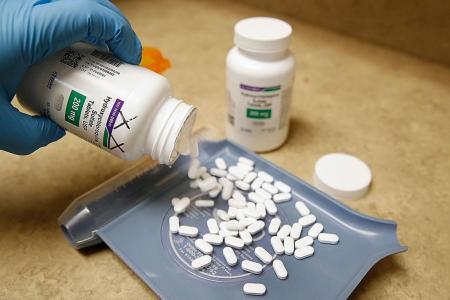
WHO suspends trials of drug promoted by Trump to fight coronavirus
Lancet study showed hydroxychloroquine did not benefit Covid-19 patients
GENEVA: The World Health Organisation (WHO) has suspended trials of the drug that US President Donald Trump promoted as a coronavirus defence.
WHO said the suspension of clinical trials of hydroxychloroquine as a potential treatment for Covid-19 is a precautionary measure.
The decision came after the publication last week of a study in the Lancet indicating that using the drug on Covid-19 patients could increase their likelihood of dying, WHO chief Tedros Adhanom Ghebreyesus told a virtual press conference.
Dr Tedros said the executive group of the Solidarity Trial, in which hundreds of hospitals across several countries have enrolled patients to test several possible treatments for the coronavirus, had as a precaution suspended trials using that drug.
"The Executive Group has implemented a temporary pause of the hydroxychloroquine arm within the Solidarity Trial while the safety data is reviewed by the Data Safety Monitoring Board," Dr Tedros said.
"The other arms of the trial are continuing," he stressed.
Hydroxychloroquine is used to treat arthritis but pronouncement from public figures such as President Trump - who announced last week he is taking the drug - has prompted governments to bulk-buy the medicine.
Brazil's Health Minister also recommended last week using hydroxychloroquine, as well as the anti-malarial chloroquine, to treat even mild Covid-19 cases.
The Lancet study found that both drugs can produce potentially serious side effects, particularly heart arrhythmia.
And neither drug benefited patients hospitalised with Covid-19, according to the study, which looked at the records of 96,000 patients across hundreds of hospitals.
In another development, WHO said countries where coronavirus infections are declining could face an "immediate second peak" if they let up too soon on measures.
The world is still in the middle of the first wave of the coronavirus outbreak, WHO emergencies head Mike Ryan told an online briefing, noting that while cases are declining in many countries, they are still increasing in Central and South America, South Asia and Africa.
Dr Ryan said epidemics often come in waves, which means that outbreaks could come back later this year in places where the first waves have subsided.
NO ASSUMPTIONS
There was also a chance that infection rates could rise again and more quickly if measures to halt the first wave were lifted too soon.
He said: "We cannot make assumptions that just because the disease is on the way down it is going to keep going down."
He said countries in Europe and North America should "continue to put in place public health and social measures, surveillance measures, testing measures and a comprehensive strategy to ensure we continue on a downwards trajectory and don't have an immediate second peak". - REUTERS, AFP